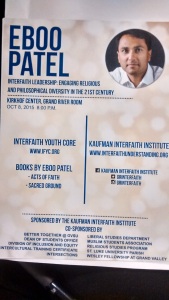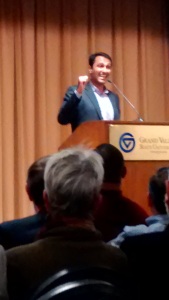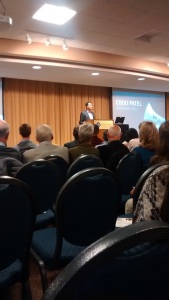Last week I had the opportunity to hear Eboo Patel, founder of the Interfaith Youth Core speak at GVSU. Here are a few highlights of his talk.
The United States is the most religiously diverse nation in human history. And the US is the most religiously devout nation in the western world. We, in the US have a choice about how we will live in an interfaith nation and and interfaith world- war or cooperation. Neither option is predetermined.
If we want cooperation we will need a critical mass of interfaith bridge builders and that is the work of the Interfaith Youth Core.
Interfaith leaders need three main skills. These skills are not primarily about thinking but are primarily about doing.
- The ability to recognize and develop and tell a public narrative. Future interfaith leaders will need to tell a story. They will need to be able to tell why interfaith work is important. This is not a philosophical argument for interfaith work. This is telling the story of real people with the real struggles and blessings of life in an interfaith nation and world.
- The ability to create activities that people of different religious orientations can do together. One value most, if not all, faith and non faith traditions hold is that of service. Serving others, helping others is a shared value. Our reasons for holding that value may be different but the value itself is what we have in common. When people from different religious orientations have the chance to work together, stereotypes and fears lessen.
- The ability to facilitate deeply felt and meaningful conversation. Leaders will need to be able to create a safe place where people can talk. They will need to ask the right questions and to identify areas of dialogue. These conversations should not focus immediately on deep differences. Deep differences exist and need to be addressed, but not right away. First people need to get to know each other, explain what is important about their faith and so on.

 As someone involved in campus ministry, I find that many students do not have any of these leadership skills. This is not the student’s fault, we as a society and as churches have not practiced this, have not modeled this and have not taught this.
As someone involved in campus ministry, I find that many students do not have any of these leadership skills. This is not the student’s fault, we as a society and as churches have not practiced this, have not modeled this and have not taught this.
Students are not the only ones who lack this abilities. Sadly many people have little experience talking with and being friends with someone outside their immediate faith tradition.
I am interested in hearing what your experiences have been. Do you know people from different faith traditions, or who have some different beliefs within your own tradition? How do you manage differences in belief and practice?
What do you think?
Those “three main skills” are elementally important and exceedingly rare, even among folks whom you would expect to have them. And that’s the problem.
Those skills, as described, are transformational for both the leader and the group. That said, all really good teachers have those skills, but REALLY good teachers are a rare thing.
I can see how important the work of Patel is, just reading through what he’s trying to bring to people. An ongoing program that provides the principles, operations, and expectations of his work would greatly benefit any church, but I only see it as an ongoing experience, with a staff superstructure and staff support. It would be a core mission. If anyone could pull that off, though… yikes:-)
Crucially important work. Something people of all faith traditions need to focus on.
IN CASE I MESSED UP MY REPLY, HERE IT IS AGAIN. Those “three main skills” are elementally important and exceedingly rare, even among folks whom you would expect to have them. And that’s the problem. Those skills, as described, are transformational for both the leader and the group. That said, all really good teachers have those skills, but REALLY good teachers are a rare thing. I can see how important the work of Patel is, just reading through what he’s trying to bring to people. An ongoing program that provides the principles, operations, and expectations of his work would greatly benefit any church, but I only see it as an ongoing experience, with a staff superstructure and staff support. It would be a core mission. If anyone could pull that off, though… yikes:-)